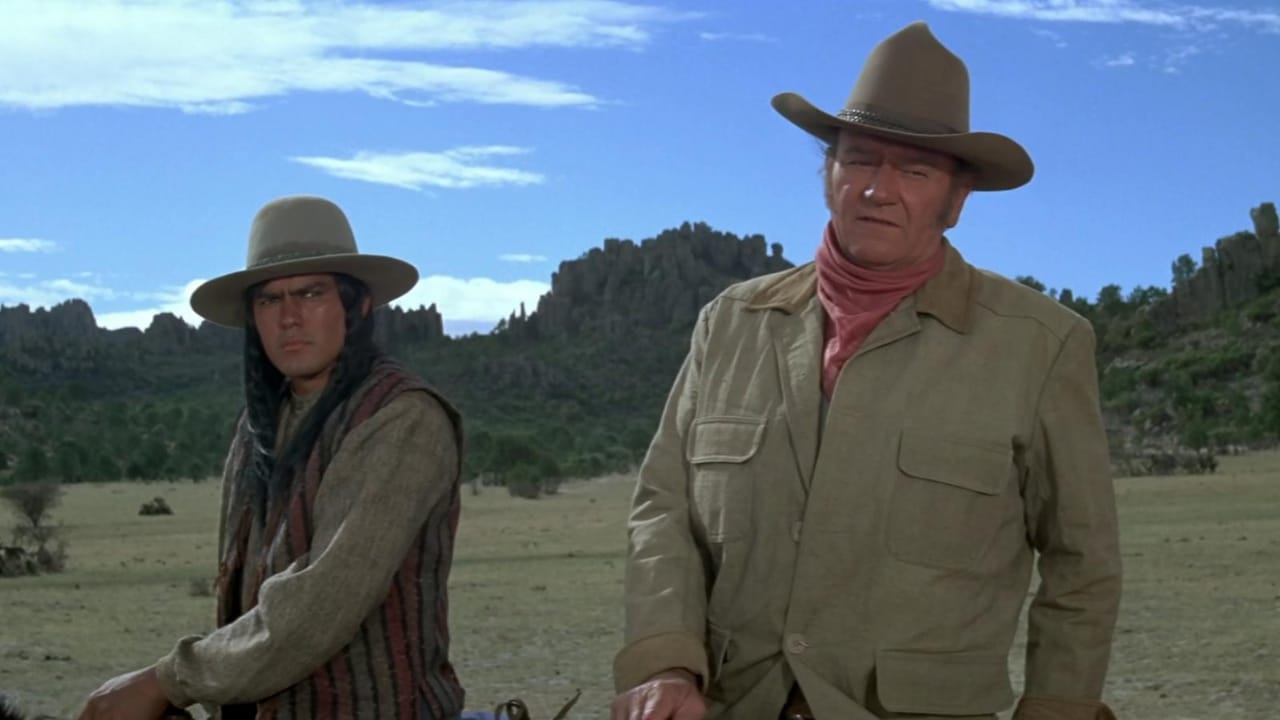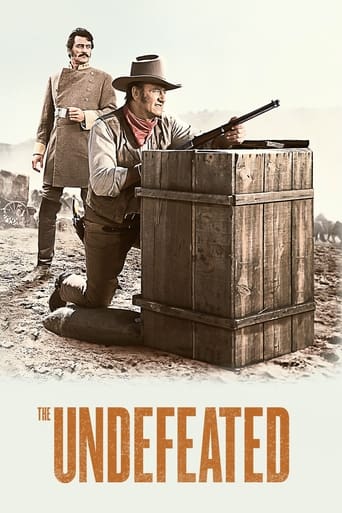

I'd watched this movie for first time in 1978 on TV and more two times now on DVD colorful,widescreen and dubbed version of course l found it better than before,John Wayne and Rock Hudson did a good job indeed,together with a great supporting casting...the story is really unbelievable if you has a minimum brain,how a rich southern Colonel will move to Mexico after lost the war??...leaving behind a large property...such wrong decision...well the film was funny like others John Wayne's movies...like Dub Taylor and his Cat a priceless characters....the other plot Wayne leaving the Army to catch wild horses to sell isn't untrue,but to sell all 3.000 horses and delivery inside the Mexico having the possibility to make this on the safe border,it's another stupid thing....Undefeated just a pleasant movie and so!!!
... View MoreBeautifully shot on location, somewhere in the vast American west. The scenes with hundreds, perhaps thousands of horses were quite impressive and owe nothing to CGI technology.On the other hand the music in older movies doesn't age well and the soundtrack in this film is pretty dreadfully intrusive and often rather annoying.As far as the story we get more of the myth of the noble rebel cause. The righteous southern plantation owner (Rock Hudson) is immediately besieged by carpetbaggers out for his slave holdings in some unnamed southern toilet. As in the myth of Gone with the Wind his slaves see him as some sort of father figure instead of someone they'd like to draw and quarter like he probably did to many of their family.And, of course, the Mexicans are portrayed as thieving scoundrels after gold and the white biznitches. And of course the Native Americans are pretty much a bad parody of those proud people but this was a western, after all, and that's what they mostly did. Thank god they don't make many these days.Let's be honest, many old movies are pretty terrible and age horribly. I think it was only in the 1970s when films began to take on a simulacrum of reality.
... View MoreThis is a typical late John Wayne western.Wayne is way past his prime,overweight and wearing an obvious toupee.Having said this he still looks like a tough old buzzard who could hold his own in a bar room brawl.Like all of his films the scenery is brilliantly photographed and the action scenes are first rate which cover up the holes in the plot.The musical score is an added bonus.The plot concerns Confederate Colonel James Langdon (Rock Hudson) who with his family and the surviving members of his regiment are heading for Mexico to start a new life offering their services to the Emperor Maximillion.Langdon has burnt his boats or at least his mansion to prevent the carpetbaggers from profiting by it.Meanwhile John Wayne's cavalry have just fought a vicious little skirmish when a rider appears and tells them of Lee's surrender(on a historical note Lee only surrendered the Army of Northern Virginia,a fact that seems to have escaped the Hollywood script writers)Under a flag of truce Wayne goes to inform his Confederate counterpart Major Saunders(Royal Dano)who tells him they already knew.An incredulous Wayne asks why they are still fighting to be told "This is our land Sir and you are on it"."But we are all Americans"replies Wayne."I know Sir"says the one armed Major"that has always been the pity of it".He holds out his one good hand and says "Thank you for your courtesy Sir".That one sequence elevates the whole film to a higher level.Royal Dano only has a brief cameo but is by far the best thing in the entire film.Wayne and his remaining troopers are demobbed,they head west rounding up wild horses with the intention of selling them to Maximillion.Of course the inevitable happens,they meet up with Langdon's ex-Confederates and at one point rescue them from Mexican bandits.Wayne takes a fancy to Colonel Langdon's widowed sister complaining to her that his ex wife is busy giving piano lessons in Boston and that she had been so busy being a lady that she forgot to be a woman.(if all he wanted was a bedroom eyed floozy perhaps he shouldn't have married her in the first place).Later with typical Southern hospitality Wayne and his men are invited to a fourth of July shindig.It all ends in a massive punch up,one of those wonderfully staged brawls that Hollywood seem to do so well.Afterwards,with nobody appearing too seriously hurt both sides agree that they have had a really good time and they all part the best of friends.The Colonel's sixteen year old daughter falls for Wayne's adopted Cherokee Indian son Blue Boy,I won't name the actor who played the part as the proverbial wooden Indian would have done just as well.A bit like this review the plot then meanders but the upshot is that Langdon's Confederates fall into the hands of Mexican revolutionaries who threaten to shoot them unless they persuade Wayne to hand over his herd of horses.Wayne agrees and united they all head back to the United States.Its all rather hard to swallow especially Langdon's acceptance of his daughter's choice of husband.Praise where praise is due,Rock Hudson plays the aristocratic Langdon to perfection with a gloriously over the top Southern accent.Its always good to see Ben Johnson and Harry Carey Jun. and John Agar make blink and you will miss them cameos,I would like to have seen a bit more of them.John Wayne is of course John Wayne,what you see is what you get.All in all an exciting colorful western if all a bit unbelievable.On another historic note General Shelby and several hundred ex- Confederates did go South into Mexico offering their services to the highest bidder.They certainly were not using the 1880-90 weaponry on show in this film.
... View MoreThis movie is fun to watch and has a lot going for it. It's pretty lightweight, however, and has numerous flawsHere are the positives:I don't think this movie would work without John Wayne in the lead. He pretty much plays the standard Duke character. That's a good thing.Excellent fundamental storyline here, mostly employing the underused post-Civil War Mexico setting. This was in interesting and colorful time period, with French occupation troops, ex-Union soldiers turned cowboys, unrepentant Confederate soldiers, Indians, Mexican rebels and corrupt army purchasing agents. Nicely done.Solid location filming. Authentic locations i.e. they actually filmed in Mexico where it takes place.Some really nice segments with an enormous herd of horses on a long drive.Solid attempts at comic relief, even if most of it falls a little flat.Good supporting appearances by Ben Johnson, Harry Carey Jr. et.al.Now here's what keeps this movie from being better:Like most Wayne Westerns after "Liberty Valence", it feels too much like a poor imitation of a John Ford film. Heck, even Ford's formula was tired by then, and these movies copy it without his infusions of subtle intelligence, wit and heart.Rock Hudson simply does not pull his role off as a Confederate officer and Southern gentleman.The plot makes a lot of sense and works well for the first half of the movie, then falls off a cliff when Wayne and Hudson meet in the desert. There are a multitude of plot holes and implausibilities that aren't worth explaining.Wayne's typical jabs against politicians and government are dated, simplistic and annoying.Wayne's portrayal of Indians during this period is also annoying and simplistic (and make no mistake that these are Wayne's movies. McLaglen is just a glorified coffee boy). Indians are always the "good guys" whom Wayne's character respects. They in turn respect him. Apparently, Indians thought capitalist entrepreneurs were just great, it's Washington bureaucrats who were the problem. This is a patently absurd and condescending view. Worse, it's flat wrong. The only people who made any attempt to protect the rights of Indians were certain parts of the Army and federal government. Private capitalists ran roughshod over them.Female parts are under characterized, flat and gratuitous.Wayne's 62 years old here and looks 72, after just surviving lung cancer. Yet, at the end of the movie, he's proposing to a woman who looks like she's 40 years old tops and is discussing starting a family. Do we need this?????What are Los Angeles Ram football players Roman Gabriel and Merlin Olsen doing in this movie? Is Wayne trying to give back, since John Ford gave him his start as a prop guy when he was a football player at USC?
... View More